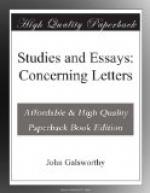MEDITATION ON FINALITY
In the Grand Canyon of Arizona, that most exhilarating of all natural phenomena, Nature has for once so focussed her effects, that the result is a framed and final work of Art. For there, between two high lines of plateau, level as the sea, are sunk the wrought thrones of the innumerable gods, couchant, and for ever revering, in their million moods of light and colour, the Master Mystery.
Having seen this culmination, I realize why many people either recoil before it, and take the first train home, or speak of it as a “remarkable formation.” For, though mankind at large craves finality, it does not crave the sort that bends the knee to Mystery. In Nature, in Religion, in Art, in Life, the common cry is: “Tell me precisely where I am, what doing, and where going! Let me be free of this fearful untidiness of not knowing all about it!” The favoured religions are always those whose message is most finite. The fashionable professions—they that end us in assured positions. The most popular works of fiction, such as leave nothing to our imagination. And to this craving after prose, who would not be lenient, that has at all known life, with its usual predominance of our lower and less courageous selves, our constant hankering after the cosey closed door and line of least resistance? We are continually begging to be allowed to know for certain; though, if our prayer were granted, and Mystery no longer hovered, made blue the hills, and turned day into night, we should, as surely, wail at once to be delivered of that ghastliness of knowing things for certain!
Now, in Art, I would never quarrel with a certain living writer who demands of it the kind of finality implied in what he calls a “moral discovery”—using, no doubt, the words in their widest sense. I would maintain, however, that such finality is not confined to positively discovering the true conclusion of premises laid down; but that it may also distil gradually, negatively from the whole work, in a moral discovery, as it were, of Author. In other words, that, permeation by an essential point of view, by emanation of author, may so unify and vitalize a work, as to give it all the finality that need be required of Art. For the finality that is requisite to Art, be it positive or negative, is not the finality of dogma, nor the finality of fact, it is ever the finality of feeling—of a spiritual light, subtly gleaned by the spectator out of that queer luminous haze which one man’s nature must ever be to others. And herein, incidentally, it is that Art acquires also that quality of mystery, more needful to it even than finality, for the mystery that wraps a work of Art is the mystery of its maker, and the mystery of its maker is the difference between that maker’s soul and every other soul.




